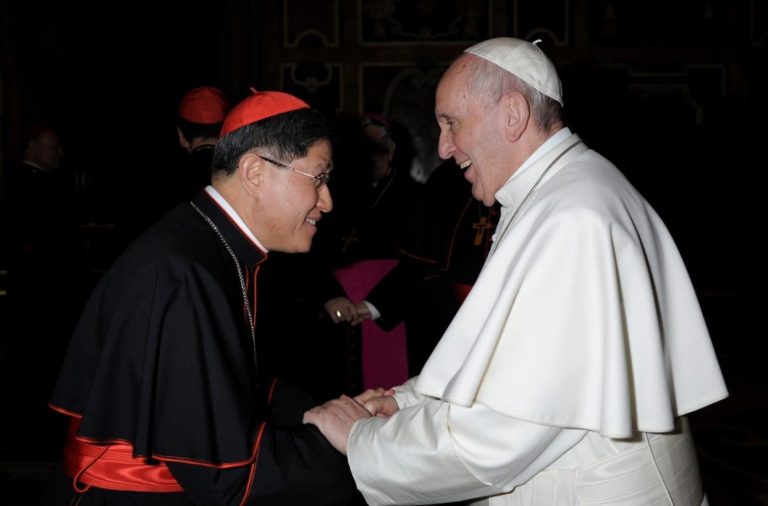Cardinal Luis Antonio Tagle says migration can be a missionary movement.
The Prefect of the Congregation for the Evangelization of Peoples told this to Exaudi’s Deborah Castellano Lubov at the Vatican Press Conference at the conclusion of the Caritas Internationalis international campaign “Share the Journey – Let’s share the journey.” The June 15 encounter took place in the Holy See Press Office on the theme: “Caritas Internationalis journeying with migrants and refugees. Looking at the future after four years of ‘Share the Journey’ campaign.”
Speaking were Cardinal Tagle, Prefect of the Congregation for the Evangelization of Peoples and President of Caritas Internationalis; Msgr. Bruno-Marie Duffe, Secretary of the Dicastery for Promoting Integral Human Development; Aloysius John, Secretary General of Caritas Internationalis; and Sr. Maria de Lurdes Lodi Rissini, National Coordinator of Caritas in South Africa, in remote connection.
Noting how the Filipino Cardinal had emphasized how the campaign formally has ended but the mission still continues, Exaudi‘s Editorial Director asked the Prefect of Propaganda Fide how he sees the Church’s closeness and concern for the Asia’s migration phenomenon, and what he believes needs an additional response.
Asia Understood Through Food
Humbling saying: “I do not claim to be an expert in all Asian affairs. Asia is the biggest continent, in fact we say there is not one Asia, but there are maybe at least five ‘Asias,’ depending on how you describe it: we prefer to describe it through food.”
“We have curry Asia, we have chopsticks Asia, we have banana leaf Asia,” he said smiling. “It is more convenient. We are brought together by our common love for food, and it is not just food, but it is coming together.”
During the meal, he reflected, is where stories are shared.
“It is sad to say that in some parts of Asia, this coming together to share a common meal, to share a common dream, to share the fruits of the common land, is still an elusive dream,” he seriously lamented, blaming many cultural, ethnic and economic factors.
“There are numerous barriers,” he said.
“And here with truthfulness, and we say ‘holy pride,’ we see that in some parts, there is tense division. It is the Church which is a minority in many parts of Asia, [but] it is this Church that is still able to bring people together, especially through Her services: through education, through the schools, and more.”
Church May Be the Minority in Asia, But Its Impact Is Powerful
“In some parts of Asia, if you have a school run by the Church, with 1000 students, you are lucky if there are 10 Christians,” he pointed out. “But through the educational system,” he continued, “they have an avenue, a space, provided by the Church, for such coming together: the clinics, the hospitals, the social services…”
In this way, he emphasized, the Church’s evangelization and the work of Caritas really blend.
“But for me,” the former Archbishop of Manila said, “it is this courageous act, where there is a space made where stateless people could come, including all those children with no names, children who are just given numbers because they were refugees, and therefore do not have the right to a name… children who were separated from parents, and do not even know if they will see their parents again.”
“One,” he decried, “hears the cries of others: I read the story of one girl who said, I heard someone crying, and I realized that I was not crying alone.”
“These are the spaces, the humble spaces, that I say with ‘holy pride,’ that I am pleased the Church provides,” Cardinal Tagle said.
With Sadness, Says Many Filipinos Would Prefer to Stay Home
Exaudi recalled that this year, the Philippines is celebrating 500 years since its evangelization. Noting that since then, Filipinos became in a sense evangelizers throughout the world, she asked the Vatican cardinal and former Archbishop of Manila what this anniversary means to him and the Philippines.
“This is again a mystery for us,” he said. “On the one hand, there is the sad reality that many Filipinos would prefer to stay home, since many in the Philippines, and many forced migrants and refugees, would prefer to stay home.”
Recalling that “Pope Benedict suggested ‘we have the right to stay in our home country,'” he highlighted however that “when there’s so much poverty and injustice, the best way for you to care for your family and life, is to run. I say this with a bit of sadness: many Filipinos who would prefer to stay home are forced, because of poverty, to find work elsewhere.”
“If you marvel at the 10 million Filipinos, outside of our country,” he said, “you would have to look at the internally displaced people, those who move from one island to another.”
Migration Can Be a Missionary Movement
“What started as some sort of forced migration, in these past 40 or 50 years, now in the hands of God,” he reflected, “has become a missionary movement, an evangelizing movement.”
In many parts of Europe and in many parts of the Middle East, and even in Asia, he acknowledged, “it is the Filipino migrants, the overseas’ Filipino workers, who are filling up the churches,” and bringing their devotions.
“I do not know how to explain it,” he admitted, “but I rejoice in it, that migration can be a missionary movement.”
Rejected Migrant Could Be Future Cardinal’s Grandfather
Noting we have seen this also among the Irish, Italians and other nations too, he reflected: “that is why my grandfather, from China, came to the Philippines. He was a convert to Catholicism.”
“He never probably imagined that one of his grandchildren would become a priest,” Cardinal Tagle said smiling, adding: “So when people are afraid of migrants, I just look at my grandfather and say ‘Wow, the migrant that you reject may be the grandfather of a future cardinal.'”
Caritas Internationalis: Closing of the Campaign “Share the Journey”










